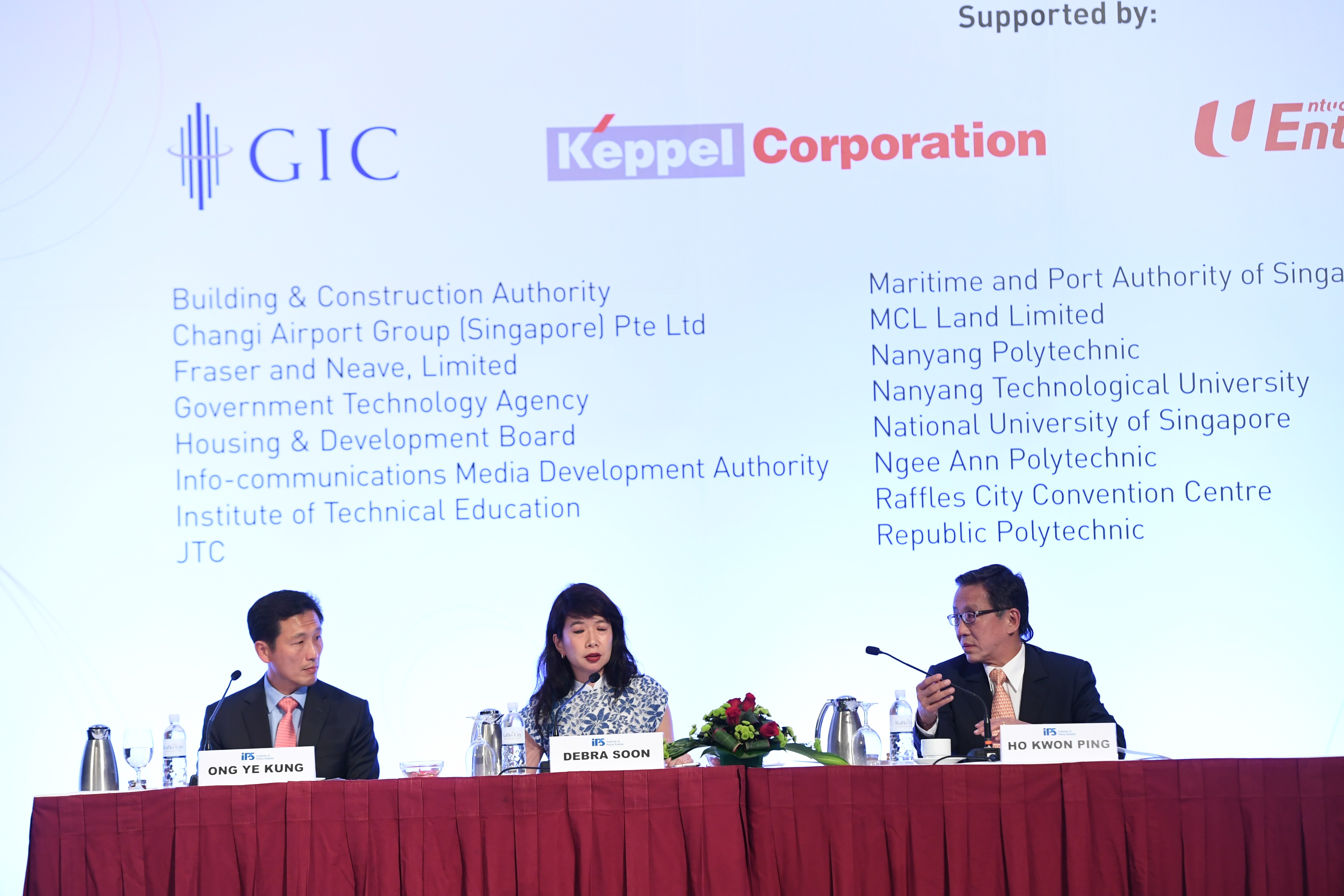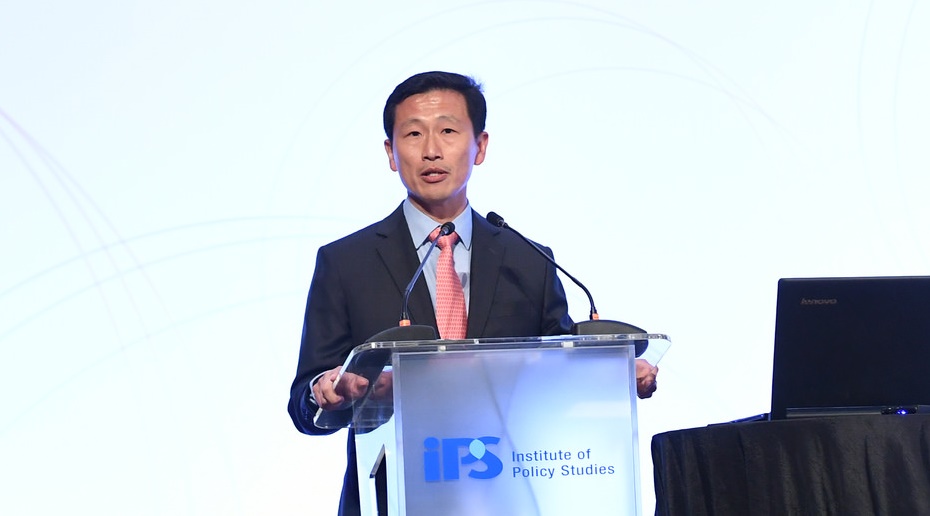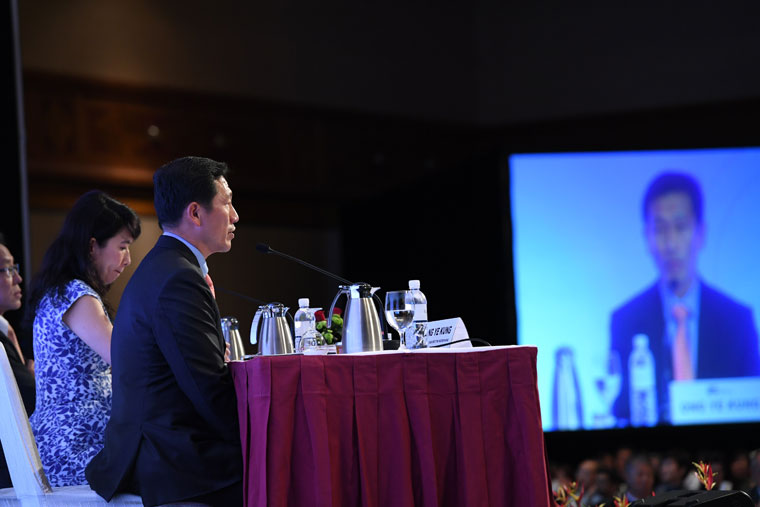"I have the pleasure of working with Minister Ong Ye Kung for about three years in negotiating the US-Singapore free-trade agreement," said the Ambassador-at-Large Tommy Koh at the annual flagship Institute of Policy Studies Singapore Perspectives conference on Jan. 23.
"From that experience as well as from the experience from working with him when he was in Keppel (Corporation), I have the highest respect for Minister Ong and regard him as credible and the leading candidate to be our next prime minister," Koh said to murmurs and applause from the audience.
For the record, this is the second time within a month that the term "Prime Minister" has been whispered in the same sentence as "Ong Ye Kung" in the public space.
The first time was when the Education Minister (Higher Education and Skills) was featured in the much-maligned Straits Times Lunch with Sumiko interview.
This was what the ST editor wrote in the piece:
"I want to capture him accurately because topping my list of questions is this rather sensitive one: How does he feel about always being described as possible prime minister material?"
Whether Ong wished for it or not, a political gravity is drawing him into PM consideration -- and his challenge in 2017 will be to decide his own role, and how to measure himself against these rising expectations.
Here are three qualities that Ong has to consider as the public gets to know him better and assess him in one of the more significant periods of his political life.
1. The first quality that surfaced when Ong is mentioned is his “ambition”.
The tag had been applied to him as he first came into public notice as a high-flying civil servant.
Ong was the Deputy Chief Negotiator for the US-Singapore Free Trade Agreement. He was also the Chief Executive of Singapore Workforce Development Agency (WDA). After leaving public service, he joined the National Trades Union Congress (NTUC) as its Deputy Secretary-General.
 Source: Institute of Policy Studies Flickr.
Source: Institute of Policy Studies Flickr.
Debra Soon, the moderator of the IPS dialogue session with Ong and Banyan Tree executive chairman Ho Kwon Ping said of Ong:
"When Ye Kung entered politics in 2011, none of us was surprised. It was perhaps a calling and a path which many of us expected".
Soon, the chief customer officer of Mediacorp, who first knew Ong "at university a long long time ago in a far far away place" (both were alumni of the London School of Economics), added:
"The loss in Aljunied was a temporary setback. And he has spent the last year and a bit since 2015 GE more than making up for lost time. In my personal uninformed view, Ye Kung has learnt the art of listening, persuading and convincing, which is so important in politics. So I look forward to his contributions towards our country's future and build the intellectual discourse and in concrete outcomes, in the years ahead."
Ambition, however, appears to be a “dirty word” in the lexicon of the People's Action Party (PAP).
The narrative among the PAP folks is one of a "reluctant politician", a high-flying civil servant who decided to give up his or her cushy job so that he or she can serve Singapore.
But there should not be such a contradiction if one's ambitions to do well is to channel these ambitions to help Singapore more. For instance, no one would question that the late Lee Kuan Yew was a man with great ambitions for himself and his country.
And one last thing on ambition: If Ong's ambitions were all that consumed him, why did he choose not to run in General Election 2006?
Ong asked his father, a Barisan Socialis MP, for his blessings, but decided "to give it more time and chose to sit out".
So, "ambition".
2. The second quality noted publicly was Ong’s political baggage.
 Source: Institute of Policy Studies Flickr.
Source: Institute of Policy Studies Flickr.
After all, Ong is the second son to the late Ong Lian Teng, one of 13 Barisan Sosialis legislative representatives elected in the 1963 General Election.
One wonders how the PAP cadre members will feel if the son of a Barisan MP becomes the fourth PM, and eventually the PAP Secretary-General.
In a 2015 feature, Lianhe Wanbao reported that many “leftists” of the past attended the wake of Ong's mother to pay their last respects, and noted how Ong would address them as "uncles" and "aunties".
But Ong is not the only child of the Barisan in the top echelons of the PAP.
In fact, the PAP now has three children of Barisan in key party positions: Ong and Murali Pillai (son of a unionist P.K. Pillai who counted leader Lim Chin Siong among his closest friends) in the PAP Central Executive Committee, and Janil Puthucheary (son of Dominic Puthucheary, a trade unionist and founding member of the PAP who left to join Barisan) as the Chair of Young PAP (YP).
Thus, "baggage".
3. The final quality is Ong's sense of power.
All these baggage are subordinate, however, to the quality that made him slightly unique among the six middle-aged men from the civil service who are seen as the fourth generation leaders.
This was his sense and experience of political power.
While others may view power as a theoretical concept, or as purely administrative, Ong had experienced first-hand the ebbs and flows of power at close range.
As Press Secretary (1997-2003) and the Principal Private Secretary (2003-2005) to Lee Hsien Loong, he has the apprenticeship of the most consequential politician of our generation at the height of his powers, when BG (NS)/ DPM Lee made the transformation into PM LHL.
As the only new member of the Aljunied GRC team in 2011, he has witnessed the fall of PAP's first GRC and the end of the Ministerial careers of his colleagues.
One cannot find himself in the politics of a country, unless he has lived through its dramas.
Ong -- one of Chinese background, son of a Barisan Socialist MP, a product of Singapore's meritocracy, and the collateral damage of the new normal GE2011 -- is one such unique politician.
Top photo from Institute of Policy Studies Flickr
If you like what you read, follow us on Facebook and Twitter to get the latest updates.
If you like what you read, follow us on Facebook, Instagram, Twitter and Telegram to get the latest updates.
